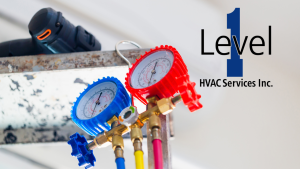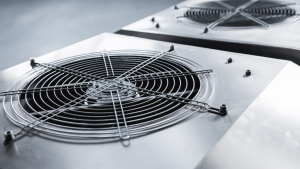Efficiency, efficiency, efficiency—that’s the name of the game these days as far as building operation goes. With the advent of smart buildings, smart cities and net zero operation; everyone is scrambling to make sure that their business is wasting as few resources as possible. That’s a good thing! Every little bit counts when it comes to working towards an eco-friendly, sustainable future. One area that can see a lot of improvement is your commercial HVAC system.
First, let’s take a quick look at how your HVAC units work. HVAC units have condenser coils which are responsible for dispersing the heat from the areas which are being cooled. Air flow over these coils is maintained by a fan in the HVAC unit. Dirt and other debris can get sucked into the unit along with the air passing over the condenser coil, clogging up the coils and impeding functionality. Studies have shown that an average airflow reduction of up to 95% can happen over the course of one year of operation, with the end result of poorer cooling and an overworked HVAC unit. In our experience as experts in the HVAC field, you’re going to want to clean these coils frequently—every quarter at the very least, and even more often if your workplace is especially dusty or dirty.
Why so often?
Coils with dirt and debris on them don’t function properly since the foreign material effectively blocks the air from carrying away excess heat. When that happens, the refrigerant in the unit can start to get too hot, which can result in damage to other components of the HVAC unit. Not only that, the refrigerant itself can even start to degrade, further shortening the lifespan of the unit.
What can happen if we don’t clean our units?
First off, you electricity bill can go up. We’ve seen that efficiency of units with dirty or corroded coils drops by as much as 50%—almost doubling the amount of electricity needed to run each unit. That kind of thing has a direct effect on your bottom line. For a commercial unit, that can work out to upwards of a thousand KwH in a single year—and that’s just for one unit!
Next, you run the risk of breaking the HVAC unit entirely. Not only do you have to spend time calling in service personnel to diagnose the issue, but you’ll also have to make do without the unit for however long it’s broken. In a worst case scenario, you’re going to have to replace the unit—and those aren’t cheap. If you’re using the HVAC unit for refrigeration of items, a broken unit could mean spoiled or compromised inventory. When you’re dealing with thousands of dollars’ worth of goods, you can’t afford to take shortcuts.
Lastly, there’s the issue of refrigerant leaks for older units which use refrigerants that are due to be phased out. Leaks of these kinds of compounds can be expensive both in terms of cleanup and loss of productivity—shutting down your workplace could be a very real possibility if the leak is bad enough and the unit is large enough. Even newer refrigerants like R-290 can be highly flammable and can force the shutdown of entire buildings if necessary.
When in doubt, call the pros
At the end of the day, if you really want to make sure that your HVAC units are in top condition, you’ll need to call in experts. While it’s all well and good to perform basic cleaning on your units on your own, sometimes problems persist even if you’ve taken all the reasonable steps that you can. Anything from broken tubing from the compressor to the fins, to full-on corrosion in parts where your cleaning efforts can’t reach—these problems are best solved by people who deal with these kinds of units every single day. Level One HVAC is ready to respond to all your HVAC needs in cases like this. If you’re interested in keeping your units efficient and reliable year after year, give us a call at (248) 486-6500. If you don’t have time for a lengthy phone call, simply fill out our online contact form and someone from our staff will be in touch with you shortly.
Visit our social media accounts for more information: Facebook Fan Page / Twitter Feed / Google+ Account / LinkedIn Company Page














